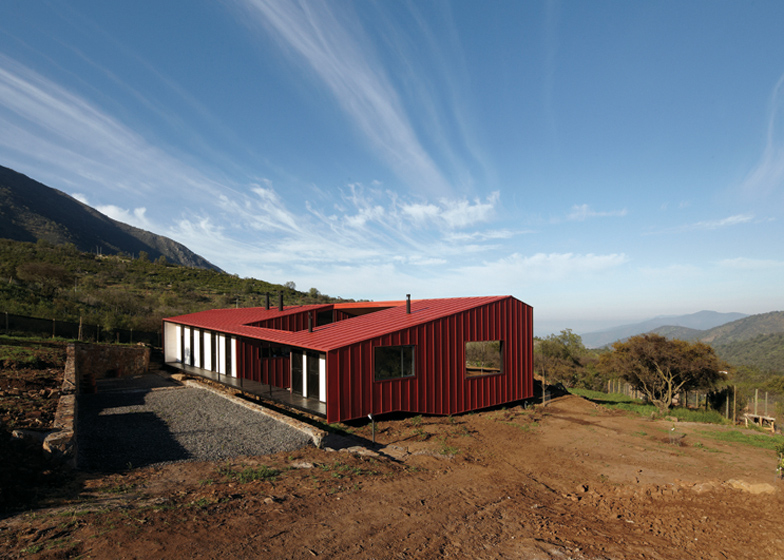Architecture studio MAPA borrowed elements and colours typically used on colonial-style Chilean houses to create this bright red residence in a winemaking region near Santiago.
MAPA designed WA House for a single resident, who presented an image of a traditional Chilean home as the starting point for the design.
Typical elements in these colonial-style residences include a central courtyard and an outdoor corridor, so the architects added these to the design and arranged living spaces around them.
They also used red powder-coated metal siding to clad the exterior walls, as red was a popular colour used on this type of building.
Spaces inside the house are separated into three groups, following the client's request for different spaces for solitude, entertaining friends and accommodating guests.
The main courtyard is positioned between the living room and the guest suite, offering views in two directions. To the west, it looks out over the Valley of Curacaví, while to the east it faces uphill towards the nearby vineyards.
The sheltered outdoor corridor stretches along the western side of the building. Floor-to-ceiling glazing connects it with the living and dining room, and a terrace at one end provides a scenic spot for dining outdoors.
Gabled walls at both ends of the building reveal a pitched roof that runs diagonally across the building, creating angular ceilings throughout the house.
"This operation directly affects the spatial organisation of the house, uniquely setting each area with an irregular relationship between skies and floors," said the architects.
Wooden floors and ceilings run through the entire building. There's also a glazed second courtyard that permits views between four different rooms.
Photography is by Cristobal Palma.
Here's a project description from MAPA:
WA House / MAPA
This architectural work is located on the outskirts of Santiago in the Valley of Curacaví characteristic within the country for its great wines. The site chosen for the house corresponds to the southern slope of the valley and is oriented toward the northwest in the direction of the distant views framed by the hills and vineyards.
The commission was made by a single man who seeks both the solitude and friends company. As a starting point he brought in the image of a Chilean colonial-style house as a reference for his future home. Both conditions give way to solve the central problems in the project, which added to the site conditions guided the following decisions:
First, develop a program in three areas: private, common and guests, which allows temper the house according to the situation that has its owner, also giving autonomy to use the premises either.
Second, take two primary elements of the Chilean colonial architecture such as the courtyard and the exterior corridor to generate distances and circulations between the three areas mentioned above.
Third, align the views in east-west direction towards the longitudinal valley on one side reaching the containment of the hills and on the other hand the escape of the remoteness of the vineyards.
Fourth, within the game of the rectangular plan the ridge is modified as the midpoint and is situated on a diagonal to the central axis of the house. This operation directly affects the spatial organisation of the house setting uniquely each area with an irregular relationship between skies and floors, which is emphasised by the application of the wood sheathing on both surfaces.
The common use sector which contains living, dining and kitchen increases the maximum height emphasising the relationship with patios and views, avoiding the strong presence of western light by placing the eaves that shape the main corridor, which also constitutes the terraces of the house.
The doors were built on site and in the case of gateways that receive morning sun we added a wicket that acts as a safety enclosure window. All the house has wood floors has been treated naturally in all venues except the living room and hallways, which applies a dark finish. The siding was made in blood red metal, a colour widely used in Chilean colonial style houses.
Architects: MAPA / Cristián Larraín, Matías Madsen, Bernardo Valdés
Location: Curacavi, Chile
Collaborators: Karina Pardo, Eduardo Corales
Structural Design: Alex Popp
Contractor: Daniel Matte
Project Area: 130 sqm
Project Year: 2010-2011
Photographs: Cristobal Palma

